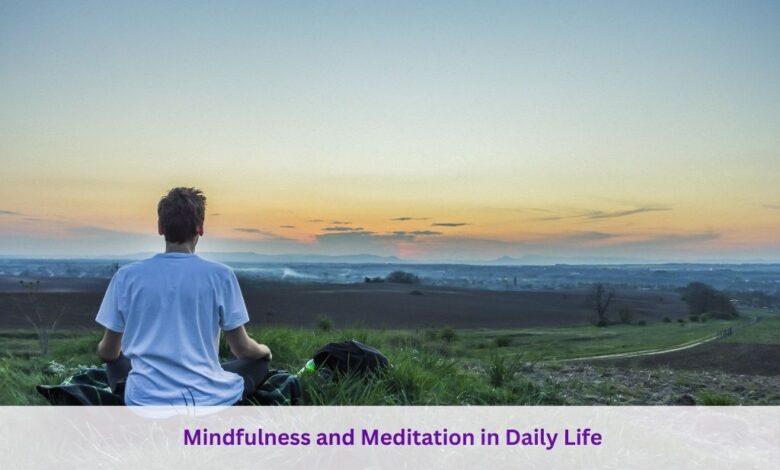Mindfulness and Meditation in Daily Life

In the fast-paced twenty-first century, when stress is a daily buddy and distractions abound, many individuals are seeking for ways to achieve serenity, boost attention, and lead a more balanced existence. Among the most effective and time-tested tools at hand for attaining this are mindfulness and meditation. Although these practices have lengthy history, their various psychological, emotional, and physical benefits have lately drawn increasing attention in modern society. This essay explores how adding mindfulness and meditation into daily life could boost overall well-being, output, and personal fulfillment.
Awareness of Meditation and Mindfulness
Appreciating the benefits will come from knowing what mindfulness and meditation actually are.
Mindfulness is the state of totally being present in the moment, aware of our location and what we
are doing, without becoming too reactive or overwhelmed by events around us. Usually subtly
acknowledging and embracing one’s emotions, ideas, and bodily sensations, this mental state is
reached by focusing one’s awareness on the present moment, On the other hand, meditation is a
technique or collection of exercises designed to help one develop attention, clarity, emotional
positivity, and a peaceful seeing of the actual nature of things by means of which Although
mindfulness is one form of meditation, meditation encompasses a wide range with techniques
including transcendental meditation, loving-kindness meditation, and breathing exercises. Taken
Collectively, these approaches. Help one to develop a condition of clarity and centeredness suited
For every sphere of life.
Decrease of tension
Among the most well-known and backed benefits of mindfulness and meditation are its ability to help one relax. Research on mindfulness has revealed that it reduces cortisol, the main stress hormone in the body. Regular meditation enables people to respond to stress in a more balanced, tranquil manner. Mindfulness enables us to alter our attitude to difficult tasks. We start to see our ideas and emotions instead of reacting automatically and emotionally. This little adjustment can make a tremendous difference in how we handle daily challenges ranging from relationship conflicts to health issues to deadlines at work.
Improved focus and attentiveness
Constant notifications and multitasking define our present life, fragment attention and reduce output. Meditation and mindfulness can help to buck this trend. Usually mindfulness meditation is on one item at a time, the breath, a mantra, or physiological sensations. Regular exercise of this assists the brain to sustain attention and improves cognitive ability. Regular meditators say they have better memory, faster information processing, and more mental clarity. Particularly in areas related to attention, memory, and learning, studies even reveal that meditation increases the gray matter density in the brain.
Enhance-emotional-stability
Mindfulness and meditation improve emotional wellness by helping individuals to have a
closer awareness of their own thinking patterns. Practitioners grow to observe their emotions compassionately and no judgingly, instead than letting negative emotions overwhelm them.
This method has been demonstrated to reduce anxiety, sadness, and emotional reactivity.
Frequent meditation allows one to acquire inner serenity, acceptance, and contentment.
It improves people’s complete view of life and enables them to get more robust against
challenges. Moreover, loving-kindness meditation also known as Metta meditation focuses
primarily on developing compassion for others and oneself, therefore increasing empathy
and positive social interactions.
Better-quality-of-sleep
Often underlying insomnia and other sleep disruptions is stress, worry, or racing thoughts. Mindfulness and meditation are one naturally occurring and effective remedy.
By relaxing the body and the mind, meditation helps the transformation into sleep to
be more natural. It reduces rumination, decreases heart rate, and regulates the neurological
system all of which help to improve the quality of sleep. Many people who add meditation
into their nighttime routine find that they fall asleep faster, sleep better, and wake up feeling
more rested.
Physical Benefits for Medicine
The mind and the body are deeply connected, hence the benefits of mindfulness transcend psychological ones. Consistent meditation and mindfulness practice have been linked several times to several physical health advantages, including: Meditating reduces hypertension and helps the cardiovascular system be under control. Through strengthening of the immune system, mindfulness helps the body fight off sickness. Mindfulness-based approaches help to control chronic pain by altering pain sensation. Mindfulness helps to lower stress and encourage better gastrointestinal function. Regular exercise helps regulate the endocrine system, therefore promoting general hormonal health. These physical benefits make meditation and mindfulness effective tools for
mental clarity as well as for complete wellness.
Increased self-awareness
Meditation allows one to develop in reflection and self-awareness. Regular practice helps people begin to recognize habitual thinking patterns, emotional triggers, and behavioral inclinations. Stronger self-awareness leads to stronger self-control, improved decision-making, and a closer awareness of values and life goal. It creates space between stimuli and response so that careful, deliberate action could take place instead of hasty reactions. A mindfulness practitioner might discover, for example, that they eat under stress and learn to stop and choose a better coping mechanism.
Better-Ties
Mindfulness helps one to be present, sympathetic, and communicative, therefore enhancing
the nature of relationships. When we are completely present with another person listening
without judgment, reacting with compassion, and clearly expressing ourselves, we draw closer.
Couples who meditate together occasionally say they have less conflict and more intimacy. Professional settings also benefit from conscious communication in terms of more effective leadership, conflict resolution, and team building.
Moreover, meditation helps one reduce the ego-driven urge to constantly be correct or
dominate in relationships, therefore enabling more harmonic and respectful encounters.
More creativity and capacity for problem-solving
Mindfulness helps the brain to see new ideas and perspectives of view. By silence of the brain
noise, meditation helps one to better access creative ideas and intuitive thinking. Many authors, artists, business people, and innovators use meditation as a method to boost creative thought
and handle demanding projects. It helps one sort mental clutter so that insight and inspiration
could grow. Mindfulness also enables people to create a no judging mindset that lets them study fresh possibilities free from concern for judgment or failure, so boosting more creative thinking.
Mindful-Living: Bringing Meditation off the Cushion
While a fantastic habit, the true beauty of mindfulness is discovered in bringing it into regular chores. This is known as casual mindfulness that is, fully present while eating, walking, dish-washing
or dialogue. By increasing awareness, we deepen our interaction with the surroundings and with each other. Of the daily minor incidents. Life becomes richer, more enjoyable, and more meaningful.
For example, a simple walk in the countryside may turn into a meditative experience depending
on one centers on the feelings of walking, bird sounds, or breeze. Food with awareness might the digestion, regulate weight, and inspire reverence of food.
Developing-ecological-method
If one is to really appreciate mindfulness and meditation, consistency is vital. Like in physical exercise, the results grow with time. These rules enable one to create a sustainable living style. Start small, one can change things even five or ten minutes daily. Choose a regular time for meditation that works for you, morning or evening. Use guided meditations; Headspace, Calm, or Insight Timer has many apps with structure and support. Though the benefits may not be seen right first, tenacity allows them to be readily evident, Design a peaceful area in your residence where you might practice free from disruptions. Mindfulness is not about turning into another person or obtaining a “blank mind”.
Benefits of mindfulness and meditation for daily living
Many people look for short fixes to reduce anxiety, increase happiness, and maintain mental clarity in the frenetic modern environment. Mindfulness and meditation are two methods that have lately been very popular for helping people to restore connection with the present moment and support inner tranquility. Rooted in spiritual traditions, these ancient techniques have now gained a prominent position in modern science and psychology. Regular practice lets us experience and respond to life in somewhat diverse ways.
Learning Mindfulness and Meditation
Mindfulness is the ability to give the current moment entire attention free from judgment. It implies being completely aware of your ideas, emotions, bodily sensations, surroundings, and ideas. On the other hand, the more generic word for numerous techniques used to increase awareness and focus is meditation. While mindfulness is one type of meditation, meditating generally consists in transcendental meditation, loving-kindness meditation, and guided visualization. Together, mindfulness and meditation empower people to break out from the automatic pilot mode of life and live with greater focus and purpose.
Good Results for Mental Health
Among the most well-known benefits of mindfulness and meditation are their effects on mental health. Many research by experts show that consistent practice can significantly reduce symptoms of sadness, anxiety, and stress. Through mindfulness, people learn to disconnect from negative thinking patterns instead of letting them overtake them. This knowledge creates a mental space in which one could react purposefully instead of reactively.
Moreover, increasing levels of serotonin and dopamine, the neurotransmitters connected with well-being and happiness, is meditation. These fluctuations in brain chemistry over time can support emotional resilience and a more positive outlook.
Enhanced Physical Well-being
Meditation and mindfulness benefit the body as much as the mind. These methods are well-known to reduce blood pressure, ease chronic pain, improve sleep quality, and strengthen immune systems. By reducing stress hormones like cortisol, meditation allows the body to reach a condition of relaxation and healing.
Regular meditations also promise healthier digestion and more energy. This could be because the parasympathetic nervous system, which regulates rest and repair, has chance to operate as it should when the body moves from fight-or-flight state.
More output and concentration
In a world full of distractions, concentrating has developed into a superpower. Mindfulness meditation guides one’s brain toward one item at a time. It improves the prefrontal cortex, which regulates in the brain self-awareness, attention, and decisions-making. Many times, practitioners discover they are better in time management, less distracted, and more efficient.
Besides, mindfulness increases memory and cognitive flexibility. It allows people to keep cool under pressure and to reason properly under stressful circumstances. Especially in the classroom and the office, these skills are highly helpful.
Enhanced Lines of Contact
Moreover, mindfulness allows us to modify our interactions with other people. More knowledge of our emotions and triggers enables us to be more sympathetic and patient communicator. Being aware helps one to actively listen that is, to be really present with someone without considering your reaction while they talk. This can help to reduce conflict and enhance relationships. Loving-kindness Among other forms of meditation, this one helps one develop forgiveness and compassion both toward others and oneself. These strategies can be particularly helpful for people struggling with damaged relationships or self-criticism.
Spiritual and emotional growth
While many people engage in mindfulness and meditation for pragmatic benefits, others
are drawn to their spiritual resonance. For millennia, people have followed these methods as means of self-discovery, inner serenity, and a closer relationship with life. Many times, people find more clarity, purpose, and a feeling of oneness with the world by looking inward and seeing the flow of ideas and experiences. Through a space created by meditation, people can discover their own nature, release ego-driven worries, and reach deeper realms of consciousness. This spiritual component can cause great personal development and a more meaningful life.
Including mindfulness and meditation into daily life
To get the rewards of mindfulness and meditation, you do not have to spend hours meditating
or withdrawing to a mountainside. One may clearly see changes even in a few minutes every
day. Here are some basic ideas to get going:
1.Spend five minutes conscious breathing first thing in morning.
2. Take quick breaks at work to check in with yourself, stretch, and breathe.
3. Each evening, mentally list three things for which you are glad.
4. To keep regular, use guided meditations available on apps or internet videos.
5. Try conscious walking by concentrating on every step and the sensations in
In essence, meditation and mindfulness are great skills that might improve every sphere of
life. These techniques have clear, established advantages whether your goals are spiritual
development, stress management, enhanced attention, or better relationships. Including
them into your regular schedule will help you to access a more empathetic, quieter, and
clearer version of yourself.




